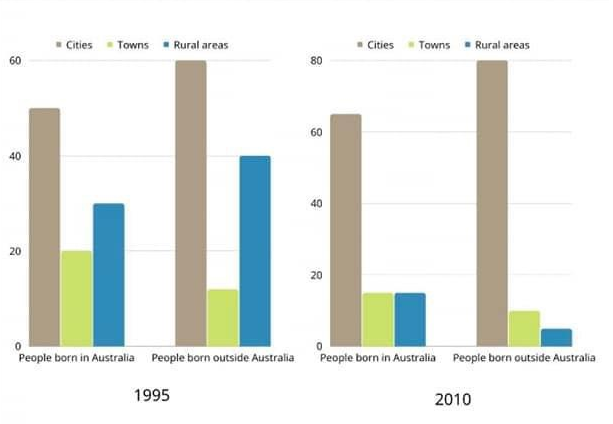[Martillah O] Writing Practice Test 983074
Task 1
You should spend about 20 minutes on this task.
The bar chart below describes some changes about the percentage of people were born in Australia and who were born outside Australia living in urban, rural and town between 1995 and 2010.
Summarise the information by selecting and reporting the main features and make comparisons where relevant.
You should write at least 150 words.

The bar chart gives information about the proportion of children born in cities, towns, and rural areas in Australia and outside Australia in 1995 and 2010.
Overall, it can be clearly seen that there is a general increase in the number of babies born in cities both in Australia and in other countries. Conversely, there was a sharp decline in births recorded in all rural areas.
In 1995, cities outside Australia had the most cases of childbirths at 60%, and further rose to 80% after 15 years. Similarly, children conceived in Australian cities significantly increased from 50% to 65% in 1995 and 2010 respectively. However, birth in rural areas outside Australia had the worst decline from 40% at the beginning to less than 10% in 2010. The proportion of babies born in Australian rural areas also fell drastically to about half of its initial records.
On the other hand, people born in Australian towns in 1995 dropped marginally from 20% to just below that in 2010. Whereas, births in towns outside Australia halved from 10% in 1995 to 5% in 2010.
Task 2
You should spend about 40 minutes on this task.
Rich countries often give money to poorer countries, but it does not solve poverty. Therefore, developed countries should give other types of help to the poor countries rather than financial aid. To what extent do you agree or disagree?
You should write at least 250 words.
Some people argue that financial aid provided from wealthier countries to developing nations has not positively impacted the fight against poverty. Apparently, they suggest that other kinds of aid should be explored to eradicate poverty and I agree that this could have a better impact than monetary help.
Since the early 19th century, developed nations have provided financial help to poor countries as a means of fighting poverty but it has not been proven to yield as good results as expected. Moreover, it is common to find that many developing and underdeveloped countries battle with corruption and this assistance provided by first-world countries has only further encouraged the misuse of funds. According to a survey conducted by the United Nations Humanitarian Committee, it was found that 85% of the money received in form of aid by poorer countries could not be accounted for since the citizens of these countries did not have knowledge of what projects their leaders utilized the funds for.
In addition, experts believe that providing educational tools and imparting technical knowledge in these economically developing countries could give visible results in expelling poverty. For instance, teaching farmers how to produce advanced locally-made storage bins could help them better store their produce, potentially increasing their income while also ensuring food availability during off-seasons and thus, reducing food waste. Similarly, equipping young people with technological skills can alleviate poverty by helping them secure better-paying jobs while solving societal problems.
In conclusion, I believe that the funds from advanced countries to developing ones should be substituted for various kinds of assistance to ensure that it has a direct impact on the poor masses, therefore, bringing an end to poverty.
Community’s feedback
Sorry! We couldn't find any contents.
Score Given by Community
Give a bandscoreLeaderboard:
| # | User | Score | Time | |
|---|---|---|---|---|
| Kento Nanami |  | 8.5 | 52:31 | |
| Nayef Alhajraf |  | 8.5 | 60:00 | |
| Ella Ruppo |  | 7.5 | 59:39 | |
| 4 | chengxi yu |  | 7.0 | 00:00 |
| 5 | avin chui |  | 7.0 | 59:11 |
| 6 | 癫 火 |  | 7.0 | 59:51 |
| 7 | Li Xuefeng |  | 6.5 | 03:46 |
| 8 | Chanisara Wongkongsang |  | 6.5 | 56:37 |
| 9 | Dan H |  | 6.0 | 50:41 |
| 10 | Carlo Di Giacomo |  | 6.0 | 60:00 |



